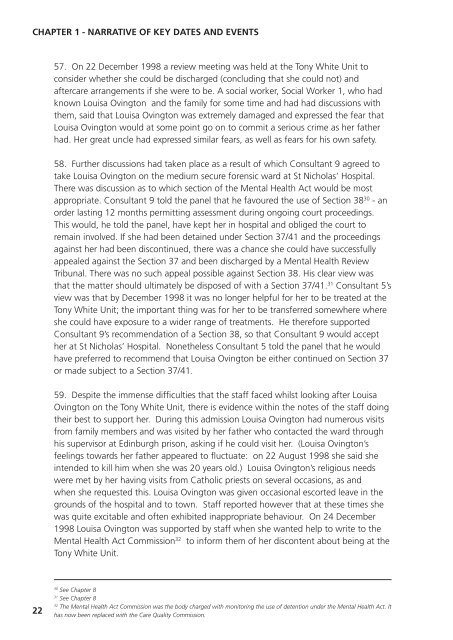Lousia Ovington independent investigation report ... - NHS North East
Lousia Ovington independent investigation report ... - NHS North East
Lousia Ovington independent investigation report ... - NHS North East
You also want an ePaper? Increase the reach of your titles
YUMPU automatically turns print PDFs into web optimized ePapers that Google loves.
CHAPTER 1 - NARRATIVE OF KEY DATES AND EVENTS<br />
22<br />
57. On 22 December 1998 a review meeting was held at the Tony White Unit to<br />
consider whether she could be discharged (concluding that she could not) and<br />
aftercare arrangements if she were to be. A social worker, Social Worker 1, who had<br />
known Louisa <strong>Ovington</strong> and the family for some time and had had discussions with<br />
them, said that Louisa <strong>Ovington</strong> was extremely damaged and expressed the fear that<br />
Louisa <strong>Ovington</strong> would at some point go on to commit a serious crime as her father<br />
had. Her great uncle had expressed similar fears, as well as fears for his own safety.<br />
58. Further discussions had taken place as a result of which Consultant 9 agreed to<br />
take Louisa <strong>Ovington</strong> on the medium secure forensic ward at St Nicholas’ Hospital.<br />
There was discussion as to which section of the Mental Health Act would be most<br />
appropriate. Consultant 9 told the panel that he favoured the use of Section 38 30 - an<br />
order lasting 12 months permitting assessment during ongoing court proceedings.<br />
This would, he told the panel, have kept her in hospital and obliged the court to<br />
remain involved. If she had been detained under Section 37/41 and the proceedings<br />
against her had been discontinued, there was a chance she could have successfully<br />
appealed against the Section 37 and been discharged by a Mental Health Review<br />
Tribunal. There was no such appeal possible against Section 38. His clear view was<br />
that the matter should ultimately be disposed of with a Section 37/41. 31 Consultant 5’s<br />
view was that by December 1998 it was no longer helpful for her to be treated at the<br />
Tony White Unit; the important thing was for her to be transferred somewhere where<br />
she could have exposure to a wider range of treatments. He therefore supported<br />
Consultant 9’s recommendation of a Section 38, so that Consultant 9 would accept<br />
her at St Nicholas’ Hospital. Nonetheless Consultant 5 told the panel that he would<br />
have preferred to recommend that Louisa <strong>Ovington</strong> be either continued on Section 37<br />
or made subject to a Section 37/41.<br />
59. Despite the immense difficulties that the staff faced whilst looking after Louisa<br />
<strong>Ovington</strong> on the Tony White Unit, there is evidence within the notes of the staff doing<br />
their best to support her. During this admission Louisa <strong>Ovington</strong> had numerous visits<br />
from family members and was visited by her father who contacted the ward through<br />
his supervisor at Edinburgh prison, asking if he could visit her. (Louisa <strong>Ovington</strong>’s<br />
feelings towards her father appeared to fluctuate: on 22 August 1998 she said she<br />
intended to kill him when she was 20 years old.) Louisa <strong>Ovington</strong>’s religious needs<br />
were met by her having visits from Catholic priests on several occasions, as and<br />
when she requested this. Louisa <strong>Ovington</strong> was given occasional escorted leave in the<br />
grounds of the hospital and to town. Staff <strong>report</strong>ed however that at these times she<br />
was quite excitable and often exhibited inappropriate behaviour. On 24 December<br />
1998 Louisa <strong>Ovington</strong> was supported by staff when she wanted help to write to the<br />
Mental Health Act Commission 32 to inform them of her discontent about being at the<br />
Tony White Unit.<br />
30 See Chapter 8<br />
31 See Chapter 8<br />
32 The Mental Health Act Commission was the body charged with monitoring the use of detention under the Mental Health Act. It<br />
has now been replaced with the Care Quality Commission.
















